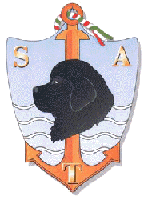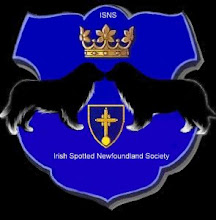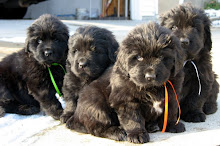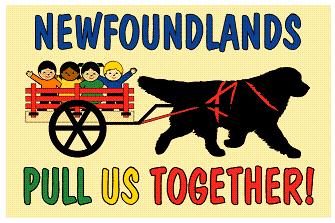Saturday, August 26, 2023
The Newfoundland Dog Who Served on Both Sides of the American Revolution
(By Jule Flavell)
"When Continental Army General Richard Montgomery was slain at the Battle of Quebec on December 31, 1775, he was quickly hailed as a martyr to the cause of liberty. An Irish-born former British Army soldier who had settled in New York two years before the dawn of the American Revolution, he accepted the rank of brigadier general in the Continental Army in 1775, risking it all for the cause of freedom.
His brave death in a hail of bullets—sword in hand in a blinding snowstorm, crying, 'Your general calls upon you' to his men just moments before being shot down—became a rallying point for the Patriot war effort. Yet this heroism contrasted starkly with his soldiers’ abandonment of their commander’s body in a disorderly retreat. Within weeks, the Continental Congress tried to rectify that blot on American valor, voting to erect a marble memorial to the fallen hero that can still be seen today at St. Paul’s Chapel in New York City, where he would eventually be interred in 1818. Yet in the immediate aftermath of his death, it was Montgomery’s fate to be laid to rest inside the fortified city he had failed to capture, surrounded by Redcoat enemies.
But a long-overlooked letter written by the sister of British General William Howe reveals that at least one loyal follower remained at Montgomery’s side after his death. Writing to a close friend, Lady Georgiana Spencer, in 1783, Caroline Howe told the stirring story of the general’s Newfoundland dog. Her letter — which I discovered while researching my 2021 book, The Howe Dynasty: The Untold Story of a Military Family and the Women Behind Britain’s Wars for America—survives in a box of largely unexplored missives at the British Library in London.
Caroline, an accomplished aristocrat who played chess with Benjamin Franklin in her London drawing room in 1775 as a cover for secret last-minute talks with the British government, promised Spencer the story 'will make you cry.' Throughout the night of December 31, she wrote, the dog lay upon his master’s half-frozen corpse, undaunted by the heavy snowstorm. The next morning, when British soldiers ventured onto the battlefield, the dog defended Montgomery’s body for as long as he could, refusing to let the Redcoat soldiers touch it.
Montgomery was buried under several feet of snow, with only a raised arm still visible. The men who found him realized he was an officer, but full identification had to wait until they carried the corpse into the city. When the body was finally removed from the field, the huge animal followed. He was the only faithful member of the general’s staff present among an assemblage of British officers and Quebec citizens at Montgomery’s funeral. The next day, the dog was discovered trying to dig up the dirt on his beloved master’s grave.
Such outstanding loyalty naturally impressed the British soldiers in Quebec, and the dog was soon adopted by another officer, Major General William Phillips, who named him Rebel. It must have seemed like a good joke for Phillips to call Rebel to heel in the British encampment, but the jest turned sour when they both became prisoners of the Continental Army.
Phillips and his loyal companion were with the British forces who surrendered at Saratoga in October 1777. The major-general was overcome with embarrassment when he found himself shouting 'Rebel!' in the company of American General Horatio Gates, and his clumsy effort to convert the call into a whistle raised a laugh among the Continental officers. The London public was equally diverted three months later, when the story reached the British newspapers, where it was a welcome distraction from the grim news of defeat at Saratoga.
Phillips never returned to Britain. A prisoner of war after Saratoga, he was exchanged in October 1780 and returned to active service, only to die of an illness, possibly typhoid, while on campaign in Virginia in May 1781, two years before the conflict’s end. Rebel’s chronicles might have ended there if not for Caroline, who was so delighted by the dog’s adventures that she wrote them down for Spencer in October 1783.
By then, the story had grown to include Rebel’s son, who carried his father’s name and, like the older canine, was an army dog. Young Rebel was the loyal follower of British Lieutenant Colonel John Lind, who had also been at Saratoga. It was Lind who relayed the dogs’ tale to Caroline’s sister, Mary Pitt, who met him when he returned home at the end of the war. Together, Lind and young Rebel reached British shores in April 1783.
Whether the original Rebel remained in America or crossed the Atlantic as the companion of another British officer went unrecorded by Caroline, but young Rebel and his master settled down to a life of peaceful leisure in Devon, England. Rebel was remarkably clever, wrote the admiring Caroline, spending his days fishing with Lind, who was a keen angler, and carrying the colonel’s catch home, unsupervised, on command.
'But one day,' she went on, 'when he had received such orders, the [Colonel] went home two hours afterwards and found the dog was arrived, but no basket. Upon which he called Rebel, gave him a good scold and asked what was become of the basket. Poor Rebel looked very silly and walked off; in half an hour, he returned, bringing the basket of fish safe. The fact was, he was seen to set down the basket to fight a dog, and in his hurry, after the engagement, he forgot his basket, but very sagaciously went to seek it where he had left it.'
It’s no wonder that Caroline recorded the story, for the Howe family was filled with dog lovers. Caroline frequently had her little dog on her lap as she corresponded in her London drawing room, making excuses to Spencer for the resulting 'blots and blurs' in her penmanship.
The story of a dog owned by Caroline’s brother William, by tradition a little fox terrier named Lila, is better known than Rebel’s. Lila was found behind American lines after the Battle of Germantown in October 1777, lost and disoriented. The inscription on the dog’s collar revealed its Redcoat master’s name. Some of General George Washington’s staff officers suggested keeping the animal as a mascot, but the American commander in chief ordered it returned to William with a polite note reading, 'General Washington’s compliments to General Howe, does himself the pleasure to return him a dog, which accidentally fell into his hands.' As one of Howe’s officers recounted, the general was so happy to see the pup that he picked it up and put it on his lap.
In the 18th century, military dogs often served as working animals, guarding baggage, tracking the enemy, carrying messages and accompanying their masters into battle. Washington, for example, chose the staghound Sweetlips as his companion during his long military service, bringing her onto the battlefield and to the First Continental Congress in 1774.
Lila and Sweetlips remained by the sides of their beloved masters throughout the conflict. But it was Rebel’s fate, like many caught up in war, to experience captivity and displacement. He was fortunate to end up in the possession of the British military, which had embraced canines as pets, companions and fellow combatants for centuries. Ultimately, his progeny flourished in the household of a wealthy Englishman."
Saturday, August 19, 2023
For Your Birthday
"Though we need to weep your loss,
You dwell in that safe place in our hearts,
Where no storm or night or pain can reach you.
Your love was like the dawn.
Brightening over our lives.
Awakening beneath the dark,
A further adventure of colour.
The sound of your voice,
Found for us
A new music,
That brightened everything.
Whatever you enfolded in your gaze
Quickened in the joy of its being;
You placed smiles like flowers
On the altar of the heart.
Your mind always sparkled,
With wonder at things.
Though your days here were brief,
Your spirit was live, awake, complete.
We look towards each other no longer.
From the old distance of our names;
Now you dwell inside the rhythm of breath,
As close to us as we are to ourselves.
Though we cannot see you with outward eyes,
We know our soul's gaze is upon your face,
Smiling back at us from within everything,
To which we bring our best refinement.
Let us not look for you only in memory,
Where we would grow lonely without you.
You would want us to find you in presence,
Beside us when beauty brightens,
When kindness glows,
And music echoes eternal tones.
When orchids brighten the earth,
Darkest winter has turned to spring;
May this dark grief flower with hope
In every heart that loves you.
May you continue to inspire us:
To enter each day with a generous heart.
To serve the call of courage and love
Until we see your beautiful face again
In that land where there is no more separation,
Where all tears will be wiped from our mind,
And where we will never lose you again."
Saturday, August 12, 2023
Subscribe to:
Posts (Atom)



















































